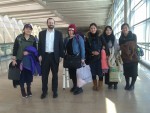Shavei Israel founder and chair Michael Freund greeted the five women from Kaifeng – left to right, Gao Yichen, Li Chengjin, Li Yuan, Yue Ting and Li Jing – at Ben-Gurion Airport on Feb. 29. (photo by Laura Ben-David courtesy of Shavei Israel)
Last month, five women from the ancient Chinese Jewish community of Kaifeng arrived in Israel to fulfil their dreams of making aliyah, thanks to the Jerusalem-based nonprofit Shavei Israel.
The women – Gao Yichen (“Weiwei”), Yue Ting, Li Jing, Li Yuan and Li Chengjin (“Lulu”) – have been studying Hebrew and Judaism for several years in Kaifeng. Upon arrival in Israel, they were greeted by Shavei Israel chair Michael Freund, who took them straight from Ben-Gurion Airport to the Western Wall (Kotel) so they could thank God for helping them return to the land of their ancestors.
“Kaifeng’s Jewish descendants are a living link between China and the Jewish people,” said Freund, who succeeded in obtaining the requisite permission to bring the Chinese Jews on aliyah after several years of struggling with the Israeli bureaucracy.
“After centuries of assimilation, a growing number of the Kaifeng Jews in recent years have begun seeking to return to their roots and embrace their Jewish identity,” Freund said, adding that, “These five young women are determined to rejoin the Jewish people and become proud citizens of the Jewish state, and we are delighted to help them realize their dreams.”
Believed to have been founded by Iraqi or Persian Jewish merchants in the eighth or ninth century, Kaifeng’s Jewish community built a large synagogue in 1163, which was renovated throughout the years. At its peak, during the Ming Dynasty (1368-1644), the Kaifeng Jewish community may have numbered up to 5,000 people, but widespread intermarriage and assimilation, and the death of the community’s last rabbi, brought about its decline by the early 19th century. Today, the community claims between 500 to 1,000 members.
Despite the pressure to assimilate, many Kaifeng Jews sought to preserve their Jewish identity and pass it down to their descendants, who continue to observe Jewish customs. Today, the community is experiencing a revived interest in its roots, and Shavei Israel has been providing support while helping some immigrate to Israel.
“Being part of the Jewish people is an honor, because of the heritage and wisdom,” said Li Jing, who on a brief previous visit to Israel put a note of prayer in the Kotel asking to return and live in Israel. “Now, my prayer has been answered,” she said.
The last time Shavei Israel was able to bring a group of Chinese Jews from Kaifeng on aliyah was in October 2009, when seven young men from the community arrived in the Jewish state. The organization has brought a total of 19 members of the Kaifeng Jewish community to Israel.
The five women plan to continue their Jewish studies at Jerusalem’s Midreshet Nishmat – The Jeanie Schottenstein Centre for Advanced Torah Study for Women, with the support of Shavei Israel, which will also cover their living expenses and support them as they prepare to undergo formal conversion by Israel’s Chief Rabbinate. Upon completion of the conversion process, they will receive Israeli citizenship.
Shavei Israel is currently active in nine countries and provides assistance to a variety of different communities such as the Bnei Menashe of India, the Bnei Anousim (referred to as the derogatory “Marranos” by historians) in Spain, Portugal and South America, the Subbotnik Jews of Russia, the Jewish community of Kaifeng in China, descendants of Jews living in Poland, and others. For more information, visit shavei.org.

